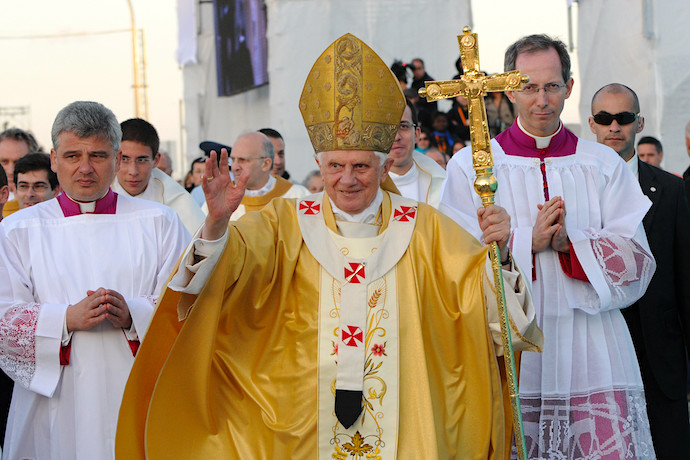Since Benedict XVI’s death on December 31, 2022, a flurry of reflections have emerged about the former Pope as a renowned professor, influential theologian, and “one of the most conservative pontiffs in recent memory.” Many of these recollections mention—sometimes apologetically—his infamous 2006 lecture in which he quoted a 15th century Byzantine emperor who described the words of Muhammad as “evil and inhuman.” Sohrab Ahmari’s piece in the New York Times goes as far as to claim that this lecture has been vastly mischaracterized; that it, in fact, made possible “deeper Catholic-Muslim dialogue.”
But these apologetic reflections over a single lecture in Benedict’s 62-year career often miss the larger point. Going back decades before the fated 2006 lecture, Benedict’s fundamental convictions about faith and reason came to undergird his later views about Islam as irrational, uncivilized, and inherently violent. Well beyond the conservativism that many have used to describe Benedict’s legacy, his views about Europe’s identity and its unique confluence of Christian faith, reason, and democracy are highly amenable to White Christian nationalism.
Reacting to widespread criticism of his lecture, the Vatican version was amended slightly, and the Pope added a footnote to distance himself from Manuel II’s views:
I hope that the reader of my text can see immediately that this sentence does not express my personal view of the Qur’an, for which I have the respect due to the holy book of a great religion. In quoting the text of the Emperor Manuel II, I intended solely to draw out the essential relationship between faith and reason.
Manuel II’s views are, no doubt, egregious. But given the correction and clarification, today’s apologists might seem to have a good case were it not for the fact that Benedict’s framing of Islam as Christianity’s violent and irrational counterpoint is grounded in his underlying theological assumptions about Christian faith and reason that extend well beyond this unfortunate quotation.
While Islam may seem only to occupy the fringes of Benedict’s extensive body of work, his convictions about faith and reason can be found in his earliest writings. For example, In Introduction to Christianity (1968), for example, which traces a lineage from Moses through Plato to early church fathers, Benedict contends that the Logos—the divine Word made flesh—in John 1 proves the “inalienable right of Greek thought to a place in Christianity.” While Benedict’s claims about compatibility between Greek philosophy and Christian faith aren’t particularly controversial, his insistence on a unique alliance between Greek thought and Christianity sets the theological backdrop for the Islamophobia and Euro-Christian supremacy seen across his later writings and speeches.
Beyond demonstrating his poor judgment in citing medieval Christian-Muslim polemics, Benedict’s 2006 lecture echoed themes of faith and reason from his earlier work and developed them in anti-Muslim directions. For example, he insisted that Christianity’s “rapprochement between Biblical faith and Greek inquiry” can stave off religious violence, an idea he contrasted to Muslim teachings about divine transcendence that only offer “the image of a capricious God, who is not even bound to truth and goodness.” Benedict’s description of Christian faith as rational and democratic is based on his projection of violence and totalitarianism onto Islam as the Christian West’s irrational other.
Benedict’s oppositional framing of Christian faith to Islam’s unreasonable deity and violent followers sets the stage for his claims about Europe’s Christian identity. The former pope’s narrative of Europe’s Christian roots is laid out in his 2006 book, co-authored with Marcello Pera, Without Roots: The West, Relativism, Christianity, Islam, which traces modern Europe’s democratic identity back to the Holy Roman Empire’s separation of religious and political authority. Benedict’s narrative credits Western Christianity with cherished contemporary values—democracy, religious freedom, and civilization—while downplaying Christianity’s imbrication with violent histories of empire and colonialism.
Even more troubling, he sutures Europe’s identity to what he terms “Greco-Christian culture,” framing ancient Greeks as the inventors of democracy which then passed through the Roman Empire to Europe. Even as Benedict praises Europe’s democratic identity for openness to “the values of outsiders,” he paints a portrait of a White, European Christian past, present, and future to the exclusion of all others.
Just as Europe’s Christian roots are responsible for its democratic ideals, Benedict also believes that Europe’s contemporary state of crisis arose from the loss of Western Christian spirituality. This crisis emerged, in part, from Europe’s valorization of “multiculturalism” that’s led to a “pathological” form of “self-hatred” and “a flight from one’s own heritage.”
Throughout Benedict’s narrative, from the Holy Roman Empire through the Crusades and contemporary Europe, Islam represents Europe’s threatening, external other. Benedict’s account of European history, as Columbia University’s Joseph A. Massad writes, “recode[s] European forms of despotism as democracy”—for example, portraying the Crusades as struggles for Christian unity against the culture-destroying threat of Islam.
As we reflect on Benedict’s life and legacy, it’s crucial to remember that despite his attempt to put out the fire from a single accusation of Islamophobia in 2006, a deeper Islamophobia is foundational to the former pope’s theological accounts of faith and reason. This is especially important in light of the fact that Benedict’s work continues to be widely taught at seminaries and universities, laying the theological and intellectual foundation for Catholics throughout the world.





